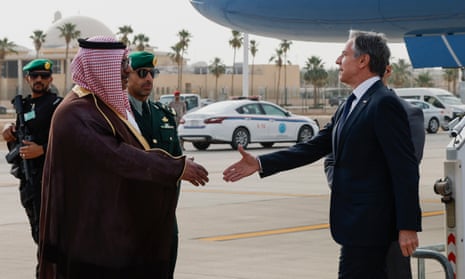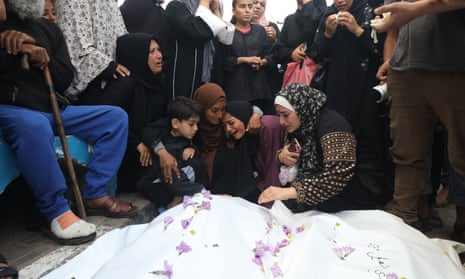Middle East crisis live: Hamas reportedly ‘positive’ on ceasefire talks; Biden urges Netanyahu against Rafah invasion
Welcome to our live coverage of the Israel-Gaza war and wider Middle East crisis. Here is a rundown on the latest developments.
Joe Biden has again spoken with Benjamin Netanyahu and reiterated his “clear position” opposing Israeli plans to invade Gaza’s southernmost city of Rafah as pressure builds on Israel and Hamas to reach a ceasefire deal.
The US president also stressed to the Israeli prime minister that progress in the delivery of humanitarian aid to Gaza should be “enhanced”, the White House said on Sunday.
The leaders’ call came ahead of the US secretary of state arriving in Saudi Arabia on Monday to try to restart the truce and hostage-release negotiations and discuss efforts to prevent a spiralling regional conflict. Antony Blinken will later continue on to Jordan and Israel on his latest visit to the region since Hamas’s 7 October attacks on Israel.

Hamas, meanwhile, said it had no “major issues” after reviewing Israel’s latest truce proposal, a senior Hamas official told Agence France-Presse. “The atmosphere is positive unless there are new Israeli obstacles.” A delegation from the Islamist group is due to arrive in Cairo on Monday to deliver the group’s response.
In other news:
The Palestinian president said that only the US could stop Israel attacking Rafah, where more than 1 million Palestinians are sheltering. Speaking on Sunday at the World Economic Forum summit in the Saudi capital, Mahmoud Abbas said he expected an assault on the Gaza city in the coming days. He added that only a “small strike” on Rafah would force the Palestinian population to flee Gaza, warning: “The biggest catastrophe in the Palestinian people’s history would then happen.”
A senior official from key intermediary Qatar urged Israel and Hamas to show “more commitment and more seriousness” in the ceasefire negotiations.
Israeli airstrikes on three houses in Rafah killed 13 people and wounded many others, medics said on Monday. Hamas media outlets put the death toll at 15. In Gaza City, in the strip’s north, Israeli planes struck two houses, killing and wounding several people, health officials said.
At least 34,454 Palestinian people have been killed and 77,575 injured in Israeli strikes on Gaza since 7 October, the Gaza health ministry said. An estimated 66 people were killed and 138 injured over the past 24 hours, the Hamas-run ministry said on Sunday.

World Central Kitchen said it was resuming its operations in Gaza, while continuing to mourn its seven workers killed in an Israeli military attack. The food aid charity paused its operations in the territory after the 1 April strikes, which the military called a “grave mistake”.
The US military said it engaged five unmanned drones over the Red Sea which “presented an imminent threat to US, coalition and merchant vessels in the region”. US central command did not say in its Sunday statement if the drones were destroyed.
France’s foreign minister said Paris had been putting forward suggestions to “avoid war in Lebanon”. “I will head to Beirut to meet political authorities to … make proposals,” Stéphane Séjourné said during a visit to the UN peacekeeping mission in southern Lebanon (Unifil) headquarters.
It is Martin Belam in London here with you for the next few hours. You can reach me at martin.belam@theguardian.com.